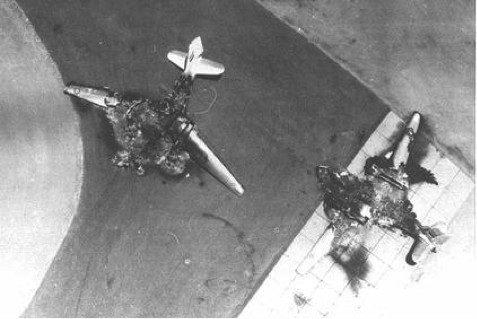
June 5, 1967
On June 5, 1967, Egypt was on alert, expecting an Israeli attack to come at dawn. However, the Israelis delayed and did not strike until 8:15 AM (Egyptian time), when most Egyptian pilots were at breakfast and Egyptian commanders were caught in traffic.
A commander of Egypt’s Malis air base, Brigadier General Tahsin Zaki said,
I heard the noise of jet planes, at the very same moment, and I looked toward the direction of the noise and saw two gray Super Mystere planes. They dropped two bombs at the beginning of the runway. Two additional planes were behind them, and they dropped two bombs in the middle of the runway, and the last two planes dropped two bombs at the end of the runway. After a couple of minutes, the whole runway was bombed. It was a complete surprise. (Michael Oren, Six Days of War: June 1967 and the Making of the Modern Middle East, New York: Oxford University Press, 2002, p. 175)
Within the first hour of the Six-Day War, Israel had destroyed 204 Egyptian aircraft. An hour after the air force struck, Moshe Dayan, Israel’s Defense Minister, gave the order for ground troops to enter Sinai.
By 10:00 AM, Egypt was releasing false reports trumpeting their success. Although Israel and the UN both assured King Hussein of Jordan that Jordan would not be attacked, Hussein responded to Egypt’s false reports and authorized Jordanian attacks against Israel. These attacks intensified by 11:15 AM and in the early afternoon, Israeli planes effectively destroyed Jordan’s air force. Heavy fighting on the ground in Jerusalem and the West Bank continued throughout the day.
During the afternoon, Israel also targeted the Syrian air force, and in eighty-two sorties destroyed two thirds of Syria’s planes. By the end of the day, 400 Arab aircraft had been destroyed. This included nearly 300 Egyptian planes and thirteen bases. Nineteen Israeli planes were destroyed on that day.
After six days of fighting, Israel had achieved a stunning victory, capturing the Golan Heights, the West Bank, Gaza, the Sinai Peninsula, and, perhaps most importantly, East Jerusalem–including the Old City. This dramatic victory had an enormous impact on Jewish communities around the world. Jewish pride swelled and international funds for Israel were generously increased.
Since 1967, Arab-Israeli negotiations have focused on the territories secured during the Six-Day War.
